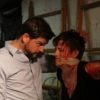The Boston Twelve
Written by Erin Trahan | Posted by: Anonymous
He may be reluctant to give himself a title, but Scott Masterson spearheaded and facilitated the distinctly structured, and distinctly Boston feature film, Twelve. It’s composed of 12 segments shot in and named for the 12 months of the year. The directors include Masterson (January), Seanbaker Carter (February), Andy McCarthy (March), Garth Donovan (April), Luke Poling (May), Noah Lydiard (June), Megan Summers (July), Brynmore Williams (August), Joan Meister (September), Marc Colucci (October), Jared Goodman (November), and Vladmir Minuty (December).
Masterson started his production career in Boston about eight years ago. He has worked on nearly a dozen major studio films and more than 400 commercials, primarily as a production assistant but more recently as an assistant director. And now he is starting to direct.
Twelve is an example of collaboration at every step, and illustrates what is happening now, or perhaps what is to come, from the Boston independent filmmaking scene. Masterson took time from his full schedule to hand-deliver a trailer and press materials (he and colleagues are furiously cutting the film for its April IFFBoston premiere) and talk with NewEnglandFilm.com.
Erin Trahan: Twelve is structurally unique — can you explain its structure and the rationale that prompted it?
Scott Masterson: The idea was to form a collaborative of directors that would allow us to have a better opportunity to make films. We sit around and we say things like, “I want to make a film, but I don’t have enough money,” so the thinking was, what if we all came together — all work as each other’s crew, all put in the same amount of money? Then I needed to figure out the format or a theme for this project, and brainstormed: get 12 directors, assign each a month, each person makes a 6-10 minute short film, the [shorts are] called that month of the year, take place that month of year, and are shot that month of year.
ET: So is there a theme that connects all twelve stories?
Masterson: Originally the idea was to harness how you see that month. Let’s say April, which is Garth Donovan’s month. To him April was about hibernation, so he did a story based on that. It wasn’t necessarily Halloween in October, or that fall has to have a horror movie, but what the month meant to each person. Besides that, we all had to do one scene at this tree in the Fens behind the MFA. At least one shot had to be a match frame, to see the seasons go by through this tree. That tied us loosely together. We needed more, so we tried intersecting all of our characters a little bit. It is subtle, more like cameos than major players. Besides those two things, in post the titling is all tied together, it definitely feels like twelve different films but they also coalesce.
ET: Did people submit scripts in advance for the group to review?
Masterson: At the beginning of each month, a script was passed out to everyone in the group to go over it, give advice, critique the script — like a big writers workshop. We were able to help each other out a lot. That was also the time we talked about production problems, like “I am looking for this prop does anyone know where I could get it?” I have connections with certain vendors, others have different connections. Pooling our resources and contacts makes an indie project that much easier. You’ve got the favors you’ve built up but also the favors everyone else has built up.
ET: Was every director responsible for writing his or her script?
Masterson: I think all [segments] were written or conceived by the director. We had a lot of cooks in the kitchen but not too many issues with egos.
ET: How did you determine the twelve?
Masterson: I brought a good friend who is a producer in town on first. I invited my top choices (some weren’t interested, which is totally understandable), some were suggestions — people I wasn’t too familiar with at first. Megan Summers [directed July] is a great example. I didn’t know her but she produced a great film and we’ve worked together since. It was great networking as well.
ET: Was part of your hope to build relationships within the filmmaking community?
Masterson: Absolutely. Everyone who took a position on the project did so to meet new people. We all want to make films in Boston and it’s tough to do that when you don’t have all the connections you need but at this point I feel we are a tight knit family — we fight every now and then but at end of day we love each other and get along.
ET: How long did it take to get the project together?
Masterson: It’s an idea that was bugging me for a few years but seemed like an overwhelming thing to start up. It just came out of frustration one day, I think it was the beginning November 2006, I started inviting people to get together. We jumped right into it even though January was right around the corner. We wondered, “Do we have to start in January? What about March to March?” But it was important to me to be in one calendar year, so I took the bullet, took January, and produced it as quickly as possible.
Marc Colucci & Luke Poling watch monitor during May.
[Click to enlarge]
ET: Did you cut and review segments before filming the next month’s?
Masterson: Each director was responsible for editing, whether they did it or got someone else to do it, as their month of shooting ended. Some took a couple of months. But as the year went by we’d see them one by one, each a little different. It was scary since we didn’t know what they would like together. I just recently saw it strung together for the first time and I think it works amazingly well. A great movie, have you seen Paris Je T’aime? The way that works is how ours will work: if you are watching something you’re not necessarily enjoying, wait five minutes, you could love what’s right around the corner.
ET: It’s reminiscent of a 48-hour film fest. Does Twelve have any alums?
Masterson: Oh no, I never want to do that, ever. Some of our directors have — Marc Colucci… Joan Meister — I know they have definitely done it in the past or worked for others, but it’s not for me. Way too much stress! But it is similar in that everyone had two days to shoot. But all the writing was done in advance.
ET: In what ways is this group representative of indie filmmakers in Boston right now?
Masterson: We have a representation of everything that is indie filmmaking in general, not just Boston. Boston is in a strange position right now, a lot of movies are coming to town, there’s a lot more production. People are joining the business because it’s a growing market. Giving directors a chance to prove themselves in a growing market is incredibly important. When production companies start reaching out to represent new directors, it would be nice for them to have a core group of filmmakers ready to make that jump, to work as directors and say hey, the next hot thing is here and here are twelve directors to start pulling in from Boston.
ET: In what ways isn’t it? Or — where are the gaps?
Genres, formats, approaches vary from segment to segment.
[Click to enlarge]
Masterson: I don’t see how it isn’t. The only thing is that we are all young filmmakers trying to get the experience required to make a bigger jump, whatever that jump may be for each of us. We are figuring it out as we go and there’s not much opportunity to do that alone. We are all Boston filmmakers. We very much want Boston to succeed in the film world and we wanted to showcase that there are great actors, locations, and directors here.
ET: What is the age range of the directors?
Masterson: I’d be guessing, maybe 26-38?
ET: Were all twelve directors versed in short filmmaking before taking this on?
Masterson: Depends on the director. A lot of us had done short films in past, had even won awards. Some I knew were great writers or editors and that’s why I invited them. Some were looking for an excuse or opportunity to make something but didn’t have the money or time or people to help them out. But all were people we knew would take the project seriously and run with it in a professional manner.
ET: Were all versed in directing?
Masterson: Same thing. I think most are very interested in being directors, though it’s not their original trade. That’s actually what lent itself to interesting perspectives; there was a constant clash of genre/writing style/shooting style. It was important to have all of that jumbled together, gave it more of a smorgasbord feel.
ET: Any segment that illustrates that clash especially well?
Masterson: I’d rather not single out just one segment. We have dramas, we have comedies, documentary, experimental, a musical, everyone’s shooting style is different. The mood jumps from one [segment] to the other; it’s a constant roller coaster ride.
ET: What did you do about rights? Could you take January and do your own thing with it?
Masterson: We drew up contracts with each of the directors that more or less said they were on hook for paying us X amount, giving us a film by a certain deadline, and the film were sold they would get this percentage. The other producer and I (we are executive producers we have company called Old Harbor Productions), our production company reserves the right to hold onto all short films and submit Twelve as feature for two years. After that we still have the feature but everyone cold submit their shorts if they want.
ET: Would you say Boston has “seasons” for filmmaking?
Masterson: The busiest season is fall, I would probably say from September through mid-November. Why? New England is pretty then, out of town companies come to town to get exteriors, whether they are major movies, or commercials; they want the pretty New England look. Winter has always been slow. Now, in general, it is all starting to pick up. There’s a constant, never-ending stream of feature films, like seven or eight right now if not in pre than being shot. I am working on one right now.
Check out the complete schedule of the Independent Film Festival of Boston. More on Twelve here.











